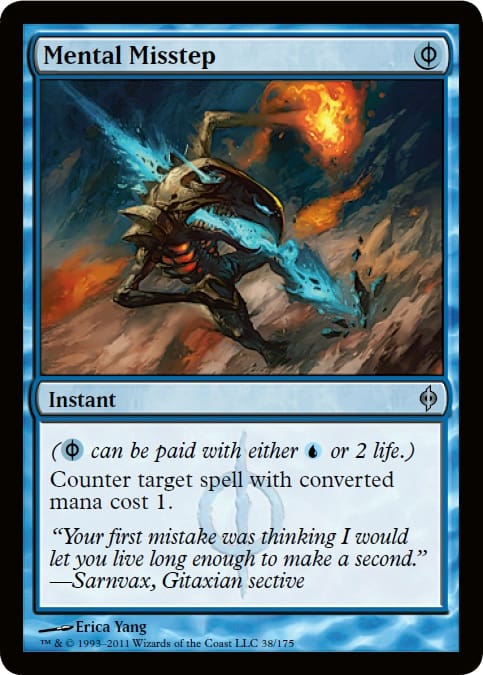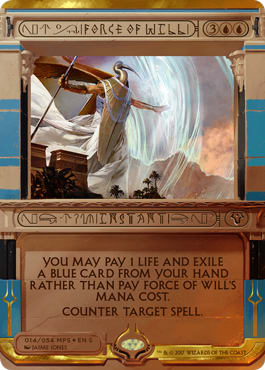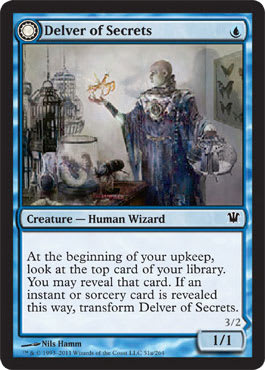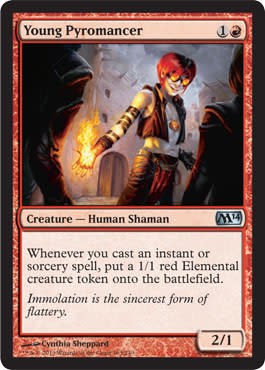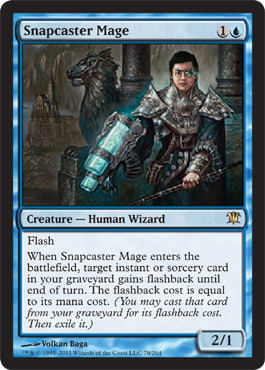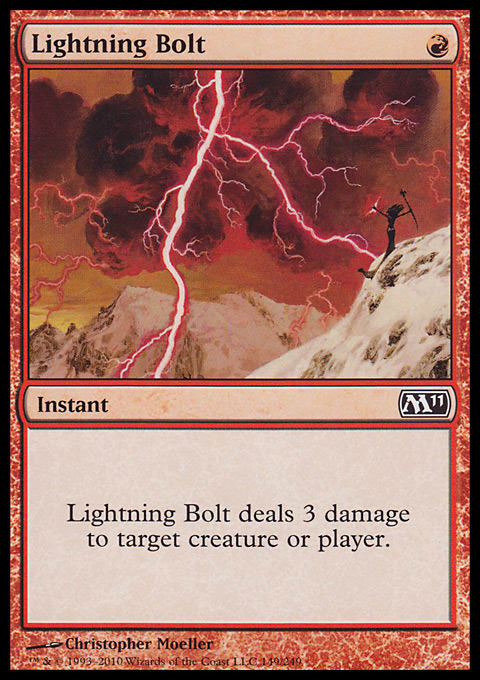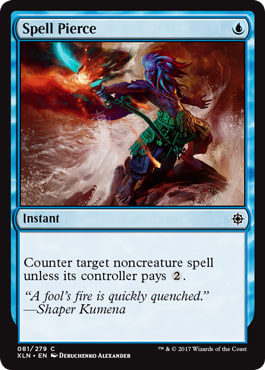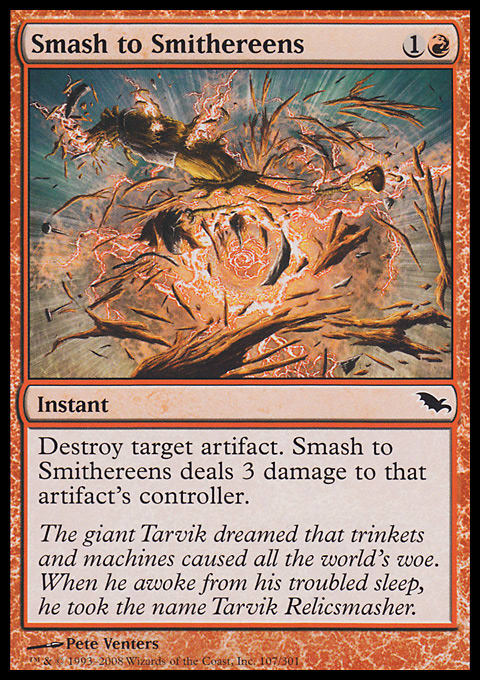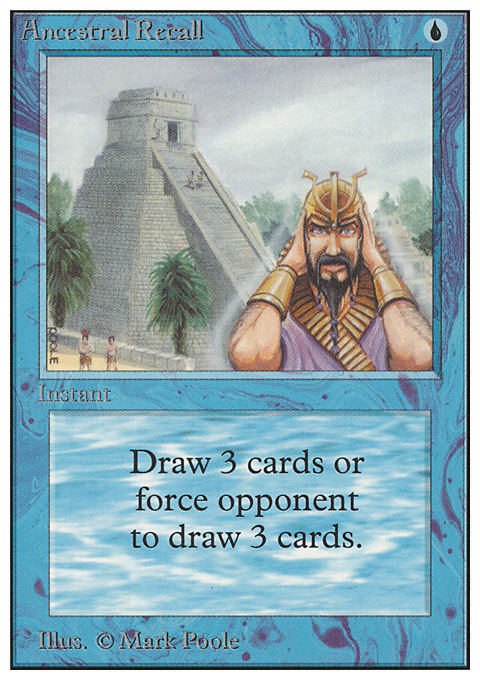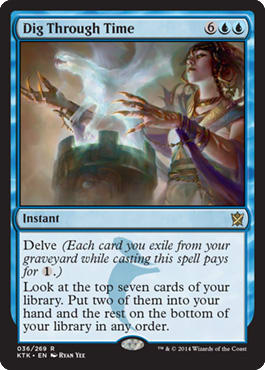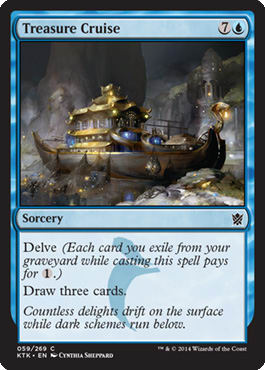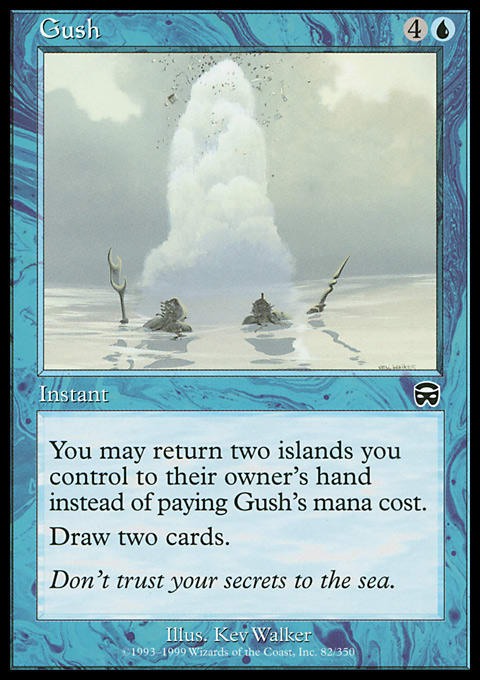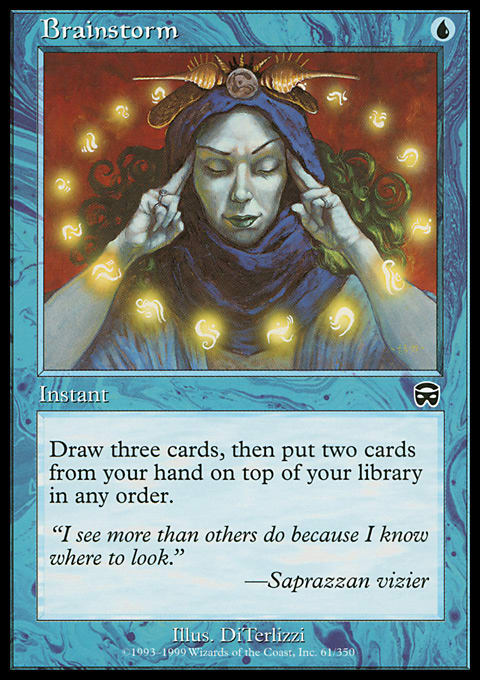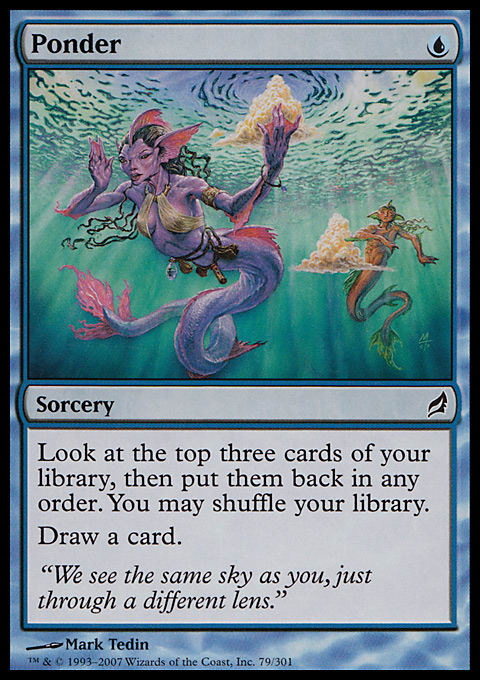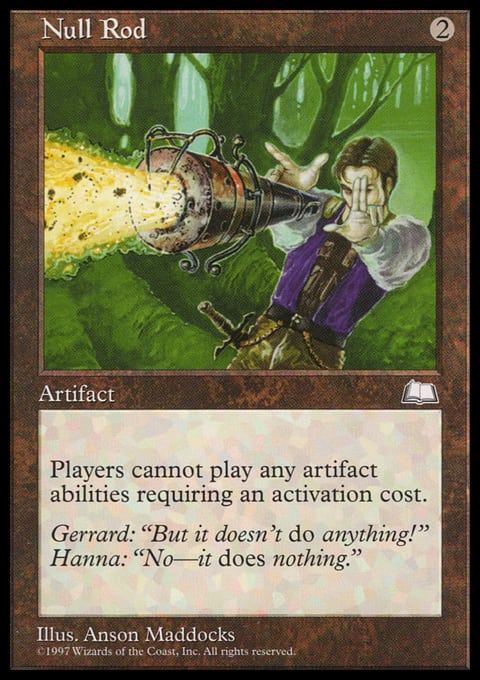Today, I would like to take a chance to write about a format that I have never written about before. It is a format that allows us to dust off some of the oldest and most powerful cards Magic has to offer: Vintage. Magic Online recently added the ability to play Vintage in the league format which has not only made the format more accessible to play for many people, but has also given us some data to make educated deck-building decisions from.
The annual Eternal Weekend is coming up later this month. For those unfamiliar, Eternal weekend hosts one of the largest Vintage events in the US every year. To help those preparing for this event I would like to share some thoughts on what is currently my favorite deck in Vintage —![]()
![]() Delver:
Delver:
U/R Delver ? Vintage | Jeff Hoogland
- Creatures (10)
- 2 Snapcaster Mage
- 4 Delver of Secrets
- 4 Young Pyromancer
- Instants (18)
- 1 Ancestral Recall
- 1 Brainstorm
- 1 Dig Through Time
- 1 Gush
- 1 Smash to Smithereens
- 2 Spell Pierce
- 3 Lightning Bolt
- 4 Force of Will
- 4 Mental Misstep
- Sorceries (8)
- 1 Gitaxian Probe
- 1 Ponder
- 1 Time Walk
- 1 Treasure Cruise
- 4 Preordain
- Artifacts (5)
- 1 Black Lotus
- 1 Mox Ruby
- 1 Mox Sapphire
- 2 Null Rod
- Lands (19)
- 1 Island
- 1 Library of Alexandria
- 1 Misty Rainforest
- 1 Strip Mine
- 1 Tropical Island
- 2 Flooded Strand
- 2 Polluted Delta
- 2 Scalding Tarn
- 4 Volcanic Island
- 4 Wasteland
- Sideboard (15)
- 4 Ancient Grudge
- 2 Flusterstorm
- 4 Grafdigger's Cage
- 1 Ingot Chewer
- 1 Pulverize
- 3 Pyroblast
One of the things I have been really enjoying about Vintage is that even though it is a format riddled with some of the most obnoxious things you can think of in Magic, fair decks like this ![]()
![]() Delver deck are not just competitive, they are good. These fair Blue decks are good because they get to play two of the best ways in Magic to stop unfair nonsense from running you out of most games:
Delver deck are not just competitive, they are good. These fair Blue decks are good because they get to play two of the best ways in Magic to stop unfair nonsense from running you out of most games:
We back up this powerful and cheap disruption with threats that can close out most games fairly quickly:
We supplement these threats with some additional disruption that we are even willing to pay some mana for:
Lightning Bolt is everything aggro control decks like ![]()
![]() Delver want to be playing. It is removal against opposing threats and doubles as reach when we are racing our opponent. Spell Pierce acts as disruption against combo decks, while also being protection against removal for our threats. Spell Pierce gets the nod over Flusterstorm in our fair deck for its ability to counter problematic cards like Jace, the Mind Sculptor and Dack Fayden.
Delver want to be playing. It is removal against opposing threats and doubles as reach when we are racing our opponent. Spell Pierce acts as disruption against combo decks, while also being protection against removal for our threats. Spell Pierce gets the nod over Flusterstorm in our fair deck for its ability to counter problematic cards like Jace, the Mind Sculptor and Dack Fayden.
Smash to Smithereens may seem like an odd main deck card at a glance, but because most Vintage decks play a variety of Moxen it is quite reasonable. Destroying an opponent’s resource while also dealing three damage to them is something we are very much in the market to be playing.
Then we get to the exciting cards. The Blue cards that let us draw more Blue cards. The lifeblood of the fun that is Vintage:
We are not playing single copies of these cards just to make our decklist sheet long — all of these cards are powerful enough to be restricted to a single copy in Magic’s most powerful format. In my experience, the only thing that feels better than casting Ancestral Recall for the first time is getting to Snapcaster Mage it back the following turn for three more cards.
We round out the relevant cards in our deck with a few other pieces of power in Mox Ruby, Mox Sapphire, and Black Lotus alongside one other hateful artifact:
Null Rod does a lot in Vintage while simultaneously doing nothing. Many decks in Vintage tend to “cheat” a bit on their overall land count by playing Moxen to let them power out spells ahead of schedule. Null Rod in conjunction with our copies of Wasteland and Strip Mine allow us to aggressively attack our opponent’s resources in some games.
When folks are new to a deck the question I get asked most often is how to sideboard with a given list. The following are the ins, outs, and some thoughts about playing the above ![]()
![]() Delver list against some of the more popular matches that I have been playing against online.
Delver list against some of the more popular matches that I have been playing against online.
VS Workshops
Out:
In:
This matchup actually feels fairly close Game 1, with us being firmly ahead in the post board games. Occasionally they will have an explosive start when we do not have Force of Will, but more often than not I find they run out of threats before we run out of answers.
The most important thing in this matchup is not drawing our sideboard cards, but simply making land drops. Shop’s best axis for attacking fair decks like Delver is attacking our mana and then playing lock pieces. Because of this it can often be right to hold Wastelands to pay for Sphere of Resistance, rather than aggressively attacking our opponent’s mana base. If we are playing a game where both of us are casting the spells we draw we will often be able to bury our non-Blue Shops opponent with our card draw.
VS Paradoxical Outcome Storm
Out:
In:
This matchup feels fairly good for the Delver deck. We have a fast clock combined with meaningful disruption. Most board we trim some of our slower cards for additional one cost disruption to bury our opponent even further. I like to cut some of our slower threats against these faster combo decks that tend to lack removal.
VS Oath of Druids
Out:
In:
Much like the Paradoxical Outcome matchup, I think the Oath of Druids matchup is fairly favorable for us. More often than not their “fair” backup plan of casting Planeswalkers and larger creatures is what ends up getting us after they play through our cheaper disruption to start. Post board we get to trim some of our less impactful disruption for more specific cards like Grafdigger's Cage and Pyroblast.
VS Sultai Control
Out:
In:
This matchup feels kind of close, but I would not be surprised if the Delver deck is a bit of an underdog here. The games I win come from getting under my opponent’s more powerful late game. Often I find myself “stealing” games on the back of Lightning Bolts and Snapcaster Mages. Abrupt Decay is an exceptionally annoying cards, surpassed only by Leovold, Emissary of Trest. Because we are both Null Rod decks it makes sense to board them out for a higher impact card like Pyroblast.
VS Dredge
Out:
In:
This matchup is just bad. Unless we have an exceptionally aggressive hand Game 1, we are going to just get run out of the game. Occasionally we can Wasteland their Bazaar of Baghdad to cause them to fumble long enough for us to steal a game, but in general we are in for an uphill battle. This is a matchup where both players will be mulliganing a lot. Post board do not keep hands without a Grafdigger's Cage unless you have a lot of pressure.
A Less Powerful Take
While one of the joys of Vintage is playing with powerful cards that are banned in other formats, power is certainly expensive to own if you are not going to have a chance to play with it in paper very often. Another reason I like this ![]()
![]() Delver deck is that it is a very reasonable choice for someone who owns Legacy cards that would like to try and dip their toe into the Vintage water before buying up some power.
Delver deck is that it is a very reasonable choice for someone who owns Legacy cards that would like to try and dip their toe into the Vintage water before buying up some power.
If I was going to build the ![]()
![]() Delver deck without any of the expensive Vintage only cards it would look something like this:
Delver deck without any of the expensive Vintage only cards it would look something like this:
Powerless U/R Delver ? Vintage | Jeff Hoogland
- Creatures (11)
- 3 Snapcaster Mage
- 4 Delver of Secrets
- 4 Young Pyromancer
- Instants (19)
- 1 Brainstorm
- 1 Dig Through Time
- 1 Gush
- 2 Smash to Smithereens
- 2 Spell Pierce
- 4 Force of Will
- 4 Lightning Bolt
- 4 Mental Misstep
- Sorceries (7)
- 1 Gitaxian Probe
- 1 Ponder
- 1 Treasure Cruise
- 4 Preordain
- Artifacts (2)
- 2 Null Rod
- Lands (21)
- 1 Mountain
- 2 Island
- 1 Misty Rainforest
- 1 Polluted Delta
- 1 Strip Mine
- 1 Tropical Island
- 2 Flooded Strand
- 4 Scalding Tarn
- 4 Volcanic Island
- 4 Wasteland
- Sideboard (15)
- 4 Ancient Grudge
- 2 Flusterstorm
- 4 Grafdigger's Cage
- 1 Ingot Chewer
- 1 Pulverize
- 3 Pyroblast
While I do think this configuration is a bit weaker than the powered up version, it is not a “strict” downgrade in every sense of the word. We’ve traded Moxen for additional basic lands which actually come in handy against Wasteland heavy decks, while also making our copies of Null Rod far less awkward. I have chosen to make the main deck slightly more aggressive in the place of things like Ancestral Recall and Time Walk with adding an additional Lightning Bolt and Snapcaster Mage.
Wrapping Up
If you are interested in diving into Vintage on the back of something that is fair and interactive, then I would highly recommend giving this ![]()
![]() Delver deck a try. I thought Legacy decks offered me a lot of different lines with their pile of one cost cards, but Vintage is an entirely new level. The complexity things like Moxen and Mental Misstep add to the game is huge. I have really enjoyed learning the format where I feel like many of my wins and losses can be directly tied to decisions I made during the game as opposed to how well my opponent’s given draw lined up.
Delver deck a try. I thought Legacy decks offered me a lot of different lines with their pile of one cost cards, but Vintage is an entirely new level. The complexity things like Moxen and Mental Misstep add to the game is huge. I have really enjoyed learning the format where I feel like many of my wins and losses can be directly tied to decisions I made during the game as opposed to how well my opponent’s given draw lined up.
Have you played ![]()
![]() Delver or Vintage in general? What do you think of it? Let me know in a comment below!
Delver or Vintage in general? What do you think of it? Let me know in a comment below!
Cheers,
—Jeff Hoogland
















